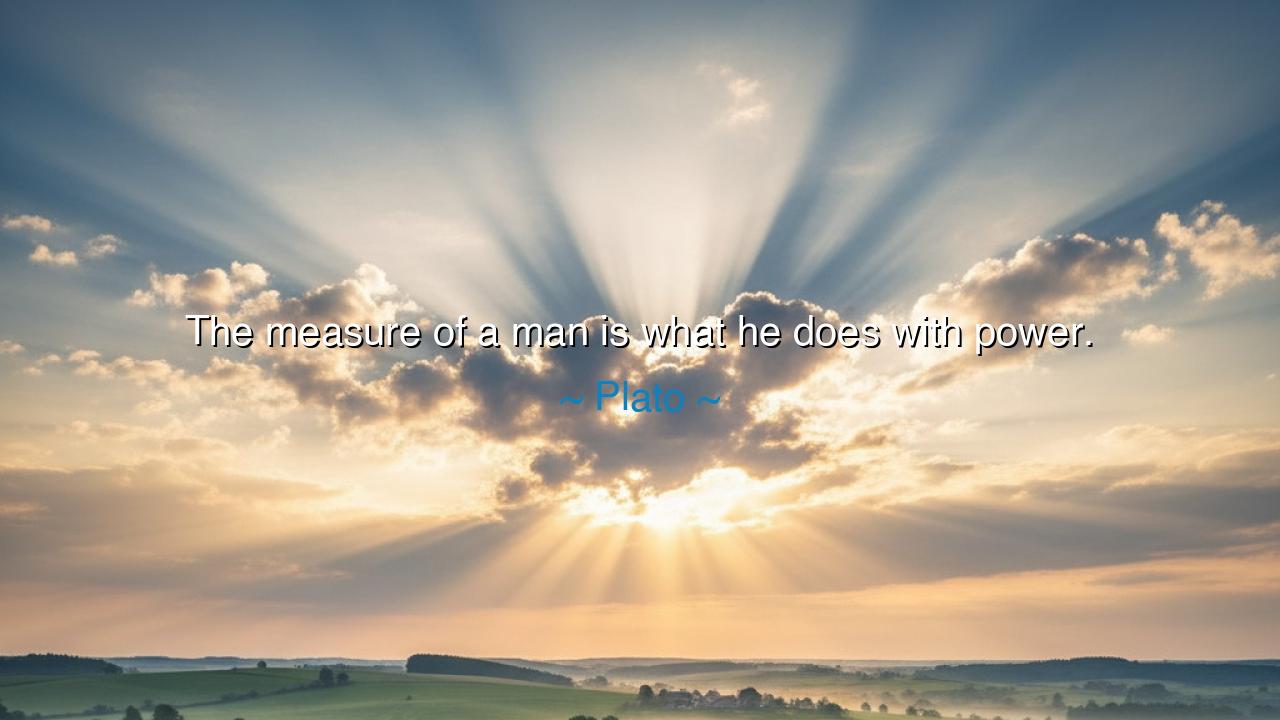
The measure of a man is what he does with power.






The words of Plato resound through the ages: “The measure of a man is what he does with power.” In this statement, the philosopher of Athens reveals the truest test of character. Wealth may dazzle, eloquence may charm, and ambition may rise high, but it is only when power is placed in a man’s hands that his soul is truly unveiled. For power is both a gift and a trial, and its use reveals whether the heart is noble or corrupt.
For the weak may be kind because they have no choice, and the humble may seem virtuous because they lack opportunity to do otherwise. But when power is granted—when one can command, reward, or punish—then the mask falls away. The just will wield power to protect, the wise will wield it to guide, but the corrupt will use it to dominate. Thus Plato teaches that the true scale of a man’s worth is not what he claims, but what he does when he has the freedom to act without restraint.
History offers countless examples. When George Washington, after victory in the American Revolution, was offered the chance to seize a crown, he refused and laid down his command. In that moment, his greatness was revealed—not by the battles he had won, but by the restraint he showed when power could have made him a king. By contrast, Julius Caesar, whose victories shook the earth, grasped power with both hands, and in doing so unraveled the very Republic that had raised him. Both men stood upon the scales Plato described, and the measure of their legacy was taken.
Plato’s warning is also timeless: the lust for power corrodes, but the right use of it ennobles. Leaders who oppress their people may rise swiftly, but their names are cursed in memory. Those who wield authority with justice and mercy may be forgotten for a time, but their legacy endures like pillars set upon stone. The measure of a man lies not in how much power he has, but in how he bends it toward the service of others.
Therefore, let this wisdom be passed on: judge no man by his promises, but by his actions when given dominion. For power reveals the truth of the soul more clearly than words or appearances. As Plato teaches, it is in the crucible of command that virtue or vice is revealed, and the measure of greatness is taken for all generations to see.






PMTran Phuong Mai
There’s something deeply moral about this idea—it suggests that power isn’t inherently good or bad, but a mirror reflecting who we are. Still, I can’t help but ask—what about those who never have power? Are they measured differently, or does Plato imply that everyone has some form of influence, however small? It’s an interesting reminder that character matters most when we hold the fate of others in our hands.
QLquoctuan le
This quote hits differently in an age of social media, where power can be as simple as having a platform. It makes me question—are we all accountable now, even in small ways, for how we use influence? The line between authority and responsibility feels thinner than ever. Maybe the measure of a person today is seen not just in grand acts, but in the choices made when no one’s watching.
KVKhanh Vy
I feel like this statement should be required reading for anyone in a leadership position. It challenges the idea that success or dominance equals greatness. Instead, it asks us to look at responsibility and restraint. But I wonder—how do we cultivate the kind of character that uses power wisely in a world that rewards ambition over virtue? Maybe that’s the real philosophical dilemma Plato was hinting at.
D0tan dat 05
It’s fascinating how timeless this observation is. Even in modern society, leadership and influence seem to magnify a person’s inner values. But I’d like to ask—how do we define power today? Is it political authority, wealth, social influence, or even knowledge? Depending on the context, what someone ‘does with power’ could look completely different, yet the moral weight behind it remains the same.
DTA Do Thi
I’ve always found this idea both inspiring and sobering. Power can elevate or corrupt, depending on how it’s handled. But it makes me curious—can anyone truly remain unchanged by it? History seems full of people who started with noble intentions and lost their way. Maybe the real challenge isn’t gaining power, but staying humble and self-aware once you have it.